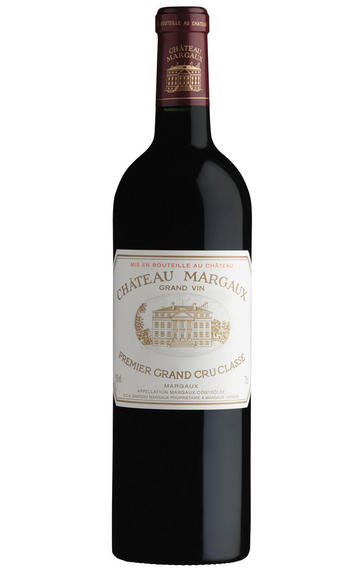
2021 Château Margaux, Margaux, Bordeaux
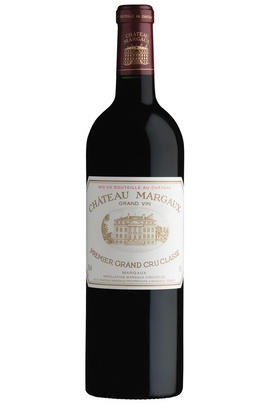
Critics reviews
The 2021 Château Margaux, aged in 100% new oak as usual, is clean and precise on the nose, much more discrete than the outgoing Pavillon Rouge and unfolds like a temptress in the glass. Intense dark cherries, hints of blueberry and trademark crushed violets then start to billow, all exquisitely defined. The palate is medium-bodied with a silky smooth veneer that does a good job disguising the structure underneath. Surprisingly plush given the growing season, the concentration is very impressive with no hard edges. It's a very Margaux-like Château Margaux insofar that it could not come from any other appéllation.
Drink 2027 - 2060
Neal Martin, vinous.com, (May 2022)
Vivid fruit, raspberries and bilberries, cassis bud, saffron and graphite, full of energy and classicism, showcasing what can be achieved in the vintage. Harvest through to October 14. 36% of the overall production. 3.64ph, Tannic index of 73, the same level as in 2019 and a litttle less than 2018 and 2020. Philippe Bascaules director, Eric Boissenot consultant.
Drink 2028 - 2044
Jane Anson, janeanson.com (May 2022)
Fragrant and floral with violet and peony notes. Clean and direct on attack, mid-palate weight and drive on the finish. Low-key but refined tannic frame. Super-length and persistence. Discreet but elegant, if less substance than a wine scoring 18 or higher.
Drink 2030 - 2050
James Lawther, jancisrobinson.com (May 2022)
The 2021 Château Margaux is clearly one of the finest wines of the vintage. Offering up a deep bouquet of raspberries, wild blueberries and plums mingled with sweet spices, violets, licorice and hints of cigar box, it's full-bodied, layered and multidimensional, with terrific depth at the core and beautifully refined, powdery tannins, concluding with a long, floral finish. Combining the vibrant flavors and moderate alcohol (13.1%) of a vintage of the last century with all the precision of the present in extraction and élevage, it is a timeless classic; and lest that be mistaken for a euphemism for a lack of concentration, note that the wine is analytically as high in polyphenols as the brilliant 2019. Representing only 36% of the estate's production, the 2021 is a blend of 87% Cabernet Sauvignon, 8% Merlot, 3% Cabernet Franc and 2% Petit Verdot.
William Kelley, Wine Advocate (Apr 2022)
A Margaux with beautiful depth and grace and wonderfully well-placed, refined tannins, showing presence and a soft texture. They caress your palate. Full-bodied, yet tight and extremely long. Seamless. 87% cabernet franc, 8% merlot, 3% cabernet franc and 2% petit verdot.
James Suckling, jamessuckling.com (May 2022)
About this WINE
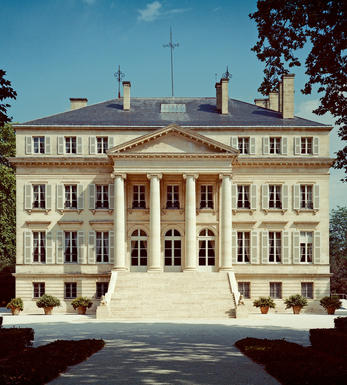
Chateau Margaux
Château Margaux, a First Growth property, has been owned by the Mentzelopoulos family since 1978. It has since consistently produced some of the finest wines in the Médoc.
One of the grandest, most imposing buildings amongst the Médoc châteaux, Ch. Margaux in its current form was built in the early 19th century, although viticulture had been practised on the estate for several centuries before. A chequered period of ownership in the 19th and early 20th century meant that the quality of some vintages was patchy. But the change which restored the property to its rightful status came in 1977 when it was bought by André Mentzenopoulos, Greek by birth but who had lived in France since 1958 and had made a fortune through supermarket retailing. André immediately instigated much-needed investment in vineyard and cellar. His untimely death in 1980 saw his daughter, Corinne, take up the reins. Corinne’s shrewdest move was the recruitment of talented young winemaker Paul Pontallier to oversee the production.
Paul would lead the estate for 33 vintages. He sadly passed away in 2016. Today, the estate is overseen by director Philippe Bascaules and technical director Sebastien Vergne, working with consultant Eric Boissenot.
The estate has 82 hectares under vine, with Cabernet Sauvignon inevitably dominant (75%) with 20% Merlot making up most of the rest, along with a smattering of Cabernet Franc and Petit Verdot. Unusually in Margaux, there is a white wine made here, Pavillon Blanc, from 100% Sauvignon Blanc, while the two red wines are, of course, Ch. Margaux itself and Pavillon Rouge. Typically, about 30,000 cases of red wine are made, with the Grand Vin usually accounting for just over 40% of the total. Production of the white wine amounts to less than 3,000 cases.
Margaux wines are renowned for their perfumed elegance, but this should not be construed as meaning that these are light-bodied. Far from it, as the best have an enviable structure, layers of complexity, and formidable length.
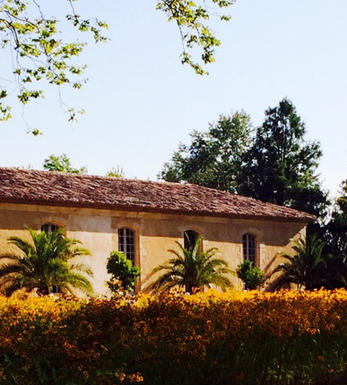
Margaux
If Pauillac can be seen as the bastion of ‘traditional’ Red Bordeaux, then Margaux represents its other facet in producing wines that are among Bordeaux’s most sensual and alluring. It is the largest commune in the Médoc, encompassing the communes of Cantenac, Soussans, Arsac and Labaude, in addition to Margaux itself. Located in the centre of the Haut-Médoc, Margaux is the closest of the important communes to the city of Bordeaux.
The soils in Margaux are the lightest and most gravelly of the Médoc, with some also containing a high percentage of sand. Vineyards located in Cantenac and Margaux make up the core of the appelation with the best vineyard sites being located on well-drained slopes, whose lighter soils give Margaux its deft touch and silky perfumes. Further away from the water, there is a greater clay content and the wines are less dramatically perfumed.
Margaux is the most diffuse of all the Médoc appelations with a reputation for scaling the heights with irreproachable wines such as Ch. Margaux and Ch. Palmer, but also plumbing the depths, with too many other châteaux not fulfilling their potential. There has been an upward shift in recent years, but the appellation cannot yet boast the reliability of St Julien. However, the finest Margaux are exquisitely perfumed and models of refinement and subtlety which have few parallels in Bordeaux.
Recommended Châteaux: Ch. Margaux, Ch. Palmer, Ch. Brane-Cantenac, Ch. Rauzan-Ségla , Ch. Dufort-Vivens, Ch. Ferrière, Ch. du Tertre, Ch. Giscours, Ch. d'Angludet.
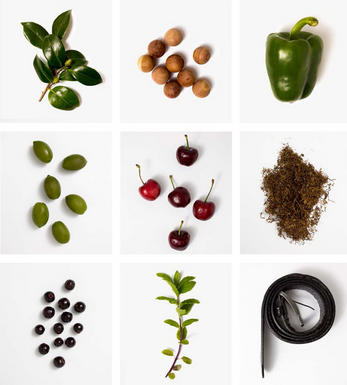
Cabernet Sauvignon Blend
Cabernet Sauvignon lends itself particularly well in blends with Merlot. This is actually the archetypal Bordeaux blend, though in different proportions in the sub-regions and sometimes topped up with Cabernet Franc, Malbec, and Petit Verdot.
In the Médoc and Graves the percentage of Cabernet Sauvignon in the blend can range from 95% (Mouton-Rothschild) to as low as 40%. It is particularly suited to the dry, warm, free- draining, gravel-rich soils and is responsible for the redolent cassis characteristics as well as the depth of colour, tannic structure and pronounced acidity of Médoc wines. However 100% Cabernet Sauvignon wines can be slightly hollow-tasting in the middle palate and Merlot with its generous, fleshy fruit flavours acts as a perfect foil by filling in this cavity.
In St-Emilion and Pomerol, the blends are Merlot dominated as Cabernet Sauvignon can struggle to ripen there - when it is included, it adds structure and body to the wine. Sassicaia is the most famous Bordeaux blend in Italy and has spawned many imitations, whereby the blend is now firmly established in the New World and particularly in California and Australia.


Buying options
Add to wishlist
Description
Only a very limited quantity of this wine is available, and sales are handled by our Account Managers. You can find out more about this service here. If you would like to hear about Bordeaux 2021 En Primeur releases, sign up here. You can browse our range of new releases here.
Cabernet Sauvignon 87%, Merlot 8%, Cabernet Franc 3%, Petit Verdot 2%
Only the vineyards that produce Margaux’s third wine were affected by frost. Mildew pressure was constant, but managed. The berries weighed in at two grams each – 100% bigger than normal. The team performed saignée on both Merlot (20%) and Cabernet Sauvignon (10%), though the Merlots from their best terroirs were superb. The biggest surprise was the phenolic content, pretty much the same as in 2018-’20. This is certainly one of the wines of the vintage. There’s nothing lightweight, yet the wine has a luminosity. The bouquet is complete and dense, but with freshness peeking through with notes of mocha and pure cassis. The palate harks back to more cerebral examples of the past. Only 13.1% alcohol, this is properly three-dimensional, whilst also hinting at the sense that it also has yet another dimension. Drink 2030-2055.
Our score: 19.5/20
Berry Bros. & Rudd, April 2022
wine at a glance
Delivery and quality guarantee